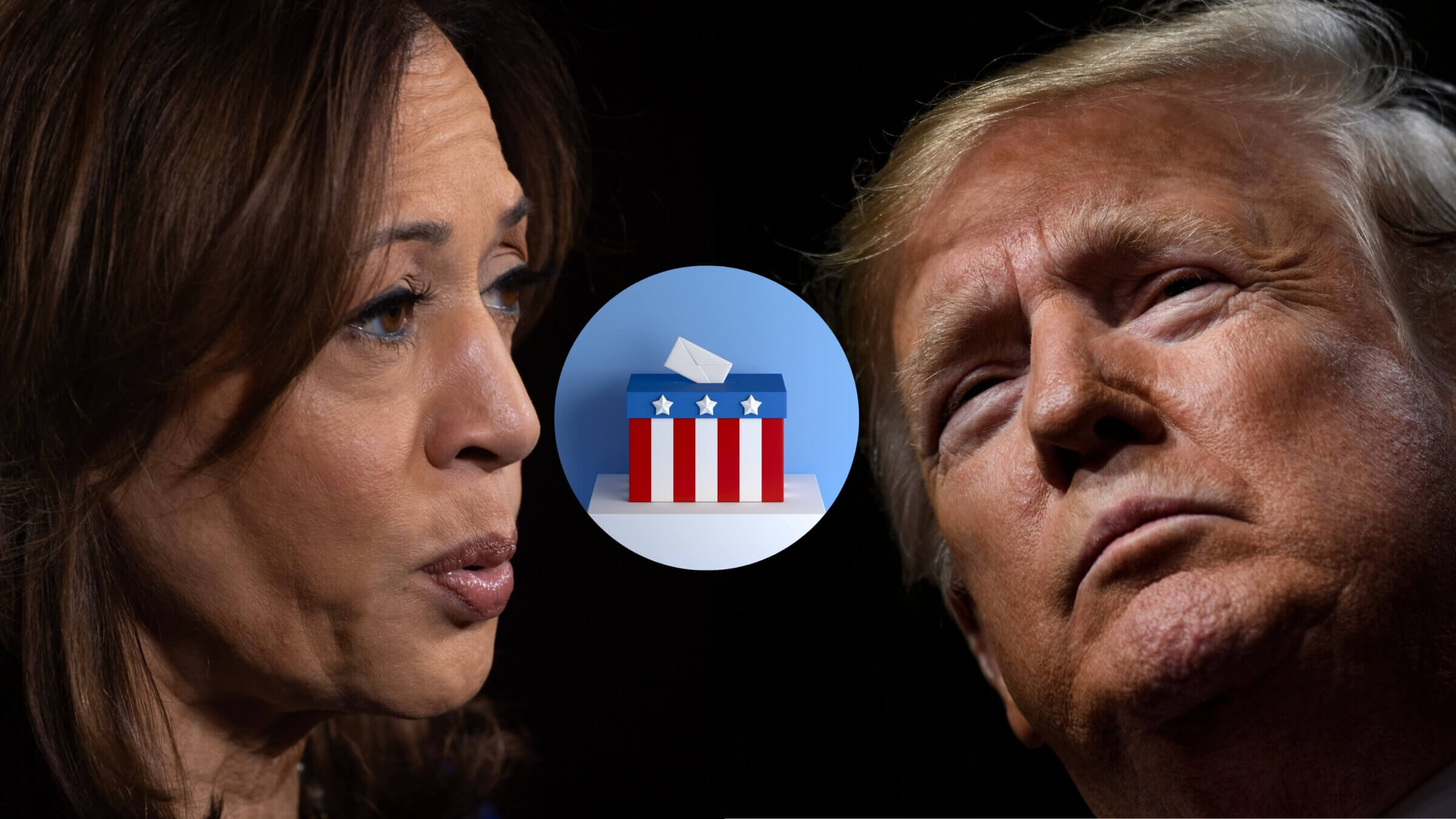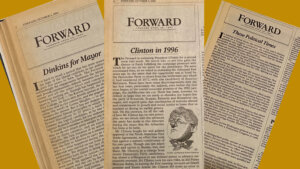This is not an endorsement for Kamala Harris — or Donald Trump
Voters should think about who the candidates surround themselves with, and how they make decisions

Both The Washington Post and the Los Angeles Times declined to endorse any presidential candidate this year. Graphic by Kamala Harris photo by Scott Olson/Getty Images; Donald Trump by Brendan Smialowski/AFP. Collage by Samuel Eli Shepherd via Canva.
This is an adaptation of our editor-in-chief’s weekly newsletter. Sign up to get it delivered to your inbox on Friday afternoons.
When I started covering the 2004 presidential election for The New York Times, the great political writer Adam Nagourney summed up the beat this way: Help readers understand how the candidate makes decisions.
Don’t get too caught up in the speeches and policy positions, Adam advised, or too focused on fundraising and poll numbers. What matters is who the presidential wannabes surround themselves with, how they think.
He pointed to 9/11 and the wars it spawned in Iraq and Afghanistan. These were the defining events of President George W. Bush’s first term, but (obviously) neither he nor his opponent uttered a single word about them during the campaign. Since we can never know what crisis any commander in chief will confront, the best we can do is glean insights from how they handled unexpected challenges before.
It’s not only good guidance for journalists, but also a useful framework for voters approaching the ballot box. Who’s in the leader’s inner circle? How do they react under pressure? What have been their key turning points, and which way did they turn? Thinking through these questions, you’ll know who you want in the White House.
And that’s all I’ll say about how to decide who to vote for on Tuesday. As a 501(c)(3) nonprofit, the Forward no longer endorses — or counter endorses — political candidates.
Endorsements erupted as a surprise late-campaign controversy this year, after the billionaire owners of The Washington Post and the Los Angeles Times shamefully intervened at the last minute to block their editorial pages from backing Vice President Kamala Harris. Several LA Times editors resigned and more than 250,000 Washington Post digital subscribers — 10% of its total — canceled in protest.
“This is cowardice, with democracy as its casualty,” posted my friend and former boss (at the LA Times) Marty Baron, who was executive editor of the Post from 2013 to 2021. “Disturbing spinelessness at an institution famed for courage.”
Jeff Bezos, the Amazon guru who bought the paper in 2013, penned a lame and belated column saying the decision was meant as a bulwark against the eroding public trust in news organizations. His argument that not endorsing would assure readers the Post is free of political bias was as porous as this bath sponge we Prime members can get delivered tomorrow for $9.99.
First of all, the Post and its peers have long, proud histories of opinion pages and news departments operating separately from each other; who the editorial board endorses does not influence how the campaign is covered. More pointedly, if Bezos is worried that political editorials endanger the public trust, why continue to publish them on divisive issues like abortion, gun rights or the war in Gaza — and to make endorsements in local races?
And why, oh why, do this abruptly in the final days of a heated campaign, after your editors have drafted their endorsement?
The only trust lost here was Post employees’ and readers’ in Bezos’ leadership.
(The owner of the LA Times, Patrick Soon-Shiong, did not even bother to publicly explain his decision. His daughter, Nika, who has accused Israel of committing genocide in Gaza and described it as an apartheid state, suggested that the endorsement was blocked because of Harris’ position on the war, something her dad denied.)
Nancy Gibbs, who runs Harvard’s media and public policy center, rightly called the two owners’ decisions “acts of self-sabotage.”
“I’m not worried that Post and Los Angeles Times readers will have trouble deciding how to vote,” she wrote in a guest essay for The New York Times (which endorsed Harris as “the only patriotic choice for president” on Sept. 30). “I’m worried they’ll have trouble deciding whom to trust.”
Me, too. Your trust is the most precious thing we journalists have. And with the rise of disinformation and polarization, it’s never been more critical.
The only political endorsements I’ve ever been involved in were more than 30 years ago at the Yale Daily News, mostly for low-stakes student government contests.

During my 21 years at The Times, I worked on the news side, which meant zero involvement in opinion, endorsements or otherwise. And by the time I got to the Forward in 2019, we’d been out of the endorsement business for nearly two decades.
Founded in 1897 as a Yiddish, socialist broadsheet, the Forward was, for its first century, a copious endorser whose choices could move thousands of votes, especially in New York City. The English Forward that Seth Lipsky created in 1990 continued that tradition.
When I called Lipsky up this week to talk endorsements, he shared a story he’s told before about a contentious meeting of the Forward Association — the paper’s governing body — over whether to endorse New York Mayor David Dinkins for reelection in 1993. The contentious part concerned the mayor’s handling of the Crown Heights riots, which had cleaved the Brooklyn neighborhood’s Black and Orthodox Jewish residents.
“They were debating it, and one guy finally says, ‘Well I just don’t think we ought to get too close to the religious,’” Lipsky recalled. “There was an audible gasp of horror around the room when the inappropriateness of that remark sunk in.
“Then there was a guy, I think he was 104 years old, very, very tall and slim, like 6-and-a-half feet,” Lipsky continued. “He gets himself upright and starts shaking his fist. He says, ‘Back in the Pale, during the pogroms, we sided with the religious.’”
The room quieted, and eventually Lipsky was told: “OK, we expect the Forward to endorse Mayor Dinkins for reelection — but not too enthusiastically.”
The endorsement called Dinkins the “logical” choice and “a worthy, if embattled, figure.” The editors said they were “impressed with the courage” he’d “shown over a long career toward Jewish concerns.” They noted the mayor had been quick to denounce the antisemitism of Louis Farrakhan, and had rushed to Israel “to be on Jewish soil when it was under attack by Iraqi Scuds.”
A few years later, in 1996, the Forward endorsed Bill Clinton — as it had in 1992 — in part because it believed him to be better for Israel than his Republican challenger, Sen. Bob Dole. The endorsement dismissed “the so-called character question” regarding Clinton, saying, “we have developed increasing respect for the cheerfulness with which the president is brushing off his accusers.”
Finally, in the last presidential endorsement we’ve been able to find in our archives, the Forward backed Al Gore in 2000, praising his “courage and prescience in addressing issues other politicians ignored,” and concluding, “No candidate has ever been more qualified for the presidency.”
By 2004, when Adam Nagourney was advising me on how to cover presidential candidates, the Forward refrained from endorsements because it was seeking 501(c)(3) tax status. Ditto when Jane Eisner became editor-in-chief in 2008 and Barack Obama was running against John McCain. (The change came through in 2009.)
“I do think newspapers ought to stand for something.”Jane Eisnerformer editor-in-chief of the Forward and editorial page editor of the Philadelphia Inquirer
Eisner came from The Philadelphia Inquirer, where she’d run the editorial page and written lots of endorsements. Controversial ones, like picking Sam Katz, a Republican, over John Street for mayor in an overwhelmingly Democratic city (Katz lost), and tedious but terrifically important ones for scores of elected judges the public knows precious little about.
Also for president: Eisner remembered it was “complicated” writing the editorial backing Clinton for reelecton in 1996 after having said he should resign if he’d lied under oath about Monica Lewinsky.
“I always felt that it was a really strong public duty,” she said of endorsements when we spoke on Wednesday. “I do think newspapers ought to stand for something — and you can do that without biasing your newsroom.”
Eisner told me she was “appalled” at the moves by Bezos and Soon-Shiong, calling their decisions “really distressing.”
Also simplistic and short-sighted. Because the point of endorsements, Eisner pointed out, is not just to persuade voters. Especially this year, “with such a polarized electorate, there’s probably little chance of that,” she said.
“It’s a statement of values,” Eisner explained, “and a way of holding people accountable. It gives you a stronger position to criticize them later.”
I heartily endorse that statement.

















